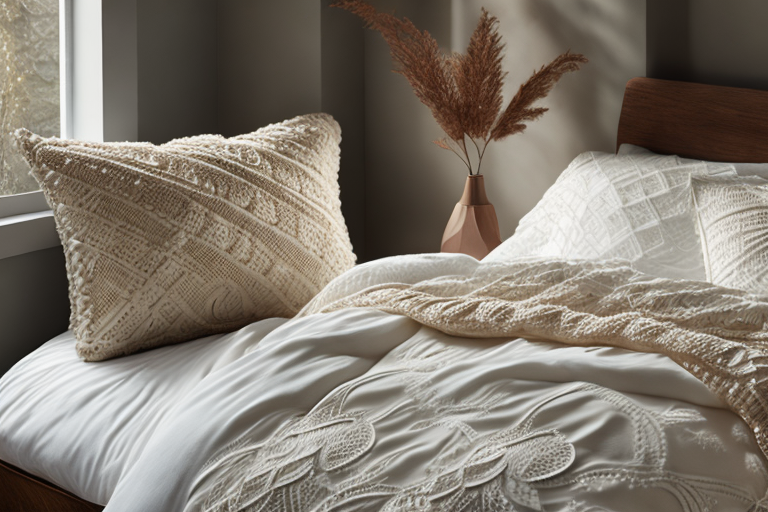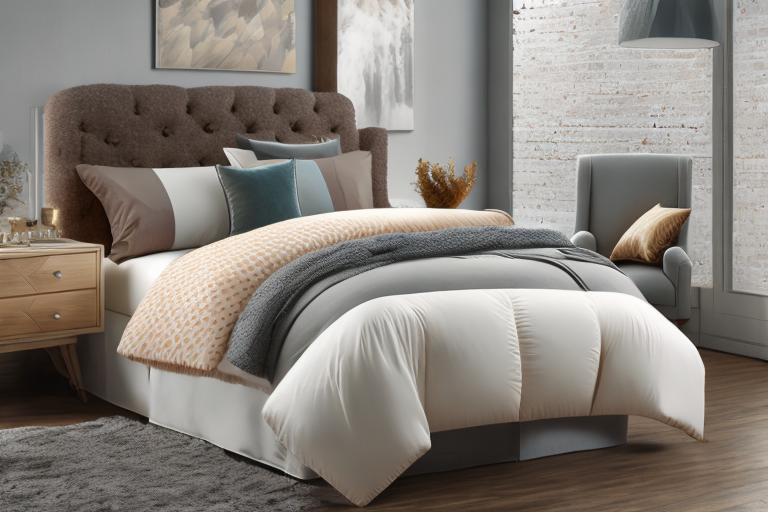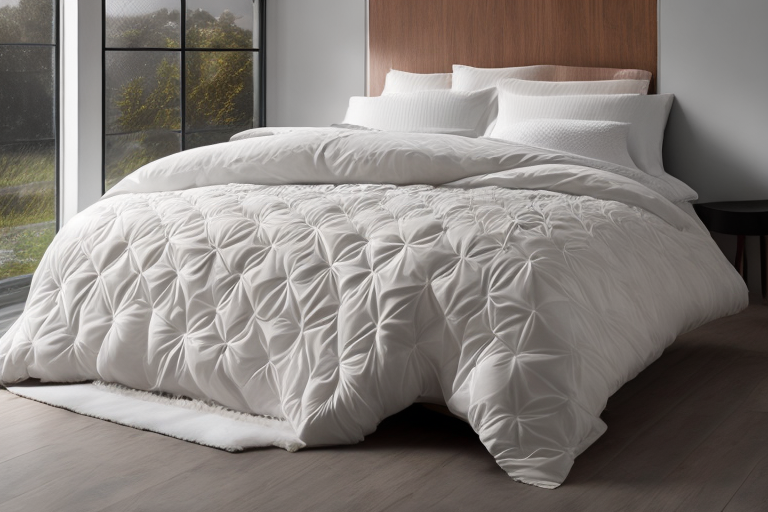When it’s time to invest in a new comforter, you may find yourself wondering: are down comforters vegan? With more people adopting plant-based lifestyles and seeking ethical alternatives to animal products, this is an important question to ask.
In this beginner’s guide, we’ll break down everything you need to know about down and down alternative comforters. You’ll learn:
- Whether down can be considered vegan
- The best hypoallergenic and vegan comforter options
- Key factors to consider when choosing ethical bedding
So cozy up in your favorite blankie and let’s get started!
What Is Down and Why Isn’t It Vegan?
Down is the layer of fine, fluffy feathers found under the rougher exterior feathers of ducks and geese. It’s prized in bedding for its lightweight warmth and cloud-like softness.
But here’s the catch – down is not vegan because it comes from animals. The production of down comforters involves live plucking of fowl – a painful process that goes against vegan ethics.
Veganism is a lifestyle and philosophy that excludes the use of animal products whenever possible. So by definition, true vegans do not use down bedding.
Down feathers up close. Credit: Zaria Academy
Finding Cruelty-Free and Vegan Comforters
Luckily, innovative bedding brands offer a wide array of down alternatives made from vegan materials. These ethical comforters mimic the billowy softness of down using synthetic and plant-based fibers.
When shopping for vegan bedding, look for certifications like:
- PETA-Approved Vegan – Ensures no animal testing or animal-derived materials
- Oeko-Tex Standard 100 – Tests for harmful chemicals
- GOTS Organic Certified Cotton – Validates organically grown cotton
Let’s explore some of the best vegan and hypoallergenic comforter options on the market.
Top 3 Vegan Comforters
Buffy Breeze Comforter
- Outer shell made from super-soft eucalyptus fibers
- Filled with recycled PET bottle polyester fill
- PETA-approved vegan certification
- $159-$169 depending on size
The Buffy Breeze comforter comes in earthy colors. Credit: Nathan Dumlao
Utopia Bedding Comforter
- Shell is soft microfiber and polyester
- Hollow siliconized fiberfill for warmth
- Affordable pricing from $30-$60
- Available on Amazon
Infinite Moon EverComfort Comforter
- Shell woven from organic cotton and polyester
- Premium PrimaLoft fill is ultra-plush
- GOTS certified organic
- $249-$289 based on size
Top 2 Hypoallergenic Down Alternatives
For allergy-free bedding, down alternatives feature synthetic fills that ward off dust mites. Key things to look for are quality materials and solid construction to prevent fill from shifting.
Stone & Beam All-Season Down Alternative Comforter
- Durable double-stitched seams
- Siliconized fiberfill made from polyethylene
- Available on Amazon
- $47-$67 depending on size
Silk & Snow Goose Down Alternative Comforter
- Premium silk-like cover with 8 corner loops
- Canadian brand with humane manufacturing
- Oeko-Tex certified safe materials
- $200-$240 based on size
How to Choose: Down vs Down Alternative

When deciding between down or down alternative comforters, there are a few key factors to weigh:
Warmth
- Down is renowned for lightweight, fluffy warmth from natural clusters trapping air
- Down alternative uses thick batting for good insulation but less air pockets
Cost
- Down ranges from $200-$500+ for high quality with high loft
- Down alternative starts around $50 for budget options up to $300
Ethics
- Down requires live plucking of fowl which raises animal cruelty concerns
- Down alternative is cruelty-free and often made of recycled materials
Allergies
- Down can trigger allergies for those sensitive to feathers
- Down alternative is hypoallergenic and resists dust mites
Maintenance
- Down needs special laundering to prevent damage to clusters
- Down alternative is machine washable and dryable
| Down | Down Alternative | |
|---|---|---|
| Warmth | Very warm from natural clusters trapping air | Synthetic fill provides decent warmth |
| Cost | $200-$500+ for high quality | $50 budget options up to $300 |
| Ethics | Not vegan; live plucking raises concerns | Cruelty-free and sustainable options |
| Allergies | Can trigger allergies | Hypoallergenic and allergy-free |
| Care | Dry clean or special wash; air dry | Machine wash and dry |
Comparison chart of down versus down alternative comforters
The choice comes down to your budget, ethics, allergy needs, and desired warmth. Both down and down alternatives come in a wide variety of quality levels.
Key Takeaways: Choosing an Ethical Comforter

When shopping for a vegan or hypoallergenic comforter, keep these tips in mind:
- Seek third party certifications to validate claims like organic cotton or vegan materials
- Compare fill power – higher numbers like 600-800fp equal more insulation
- Consider shell fabric – organic cotton, eucalyptus, microfiber etc.
- Evaluate construction and stitching to prevent fill shifting
- Read reviews and buy from reputable bedding brands
- Know policies on warranties, returns, and trial periods
- Choose the warmth level suited to your climate needs
And there you have it – everything you need to find your perfect, ethical comforter! With so many cruelty-free options available, you can sleep soundly knowing your cozy bedding aligns with your values.
We covered the key differences between down and down alternatives, highlighted great vegan and hypoallergenic picks, and discussed what to look for when comparing bedding.
Have any lingering questions about ethical comforters? What matters most to you – cost, quality, sustainability? Share your thoughts in the comments below!
Further Reading
Frequently Asked Questions
What is the warmest hypoallergenic comforter?
The warmest hypoallergenic comforters use premium down alternative fills like PrimaLoft or EliteSoft that mimic luxury down with synthetic microfibers trapping body heat. Brands like Buffy and Brooklinen offer cloud-like comforters with fill power over 500fp for winter-worthy warmth without allergens.
What should I look for in a vegan comforter?
Quality vegan comforters should have Oeko-Tex, GOTS, or vegan certifications validating the sustainable materials used. Look for durable exteriors like organic cotton or eucalyptus fabric and resilient fills like microfiber or recycled PET bottle polyester batting. Ethical down alternatives should also have even stitching and corner tabs to prevent filling from shifting.
Is down or down alternative better?
It depends on your priorities! Down alternative comforters match the cushy feel of down at a fraction of the cost. They are also machine washable and hypoallergenic. However, responsibly sourced down provides unparalleled, fluffy warmth. Ultimately, choose based on your budget, ethics, and desired features.
Why choose organic cotton bedding?
Organic cotton grown without pesticides or chemicals is better for the environment and your health. Brands like Buffy and Coyuchi use GOTS certified organic cotton covers processed without toxic bleaches or dyes. Support sustainable agriculture and fair trade principles by choosing organic comforters and sheets.
How much does a good down alternative comforter cost?
While budget options start around $50, you get what you pay for in terms of longevity. Quality down alternative comforters with nice shell fabrics and resilient fill average $150-$300. Splurge for premium hypoallergenic comforters with high fill power comparable to down for $350+.








